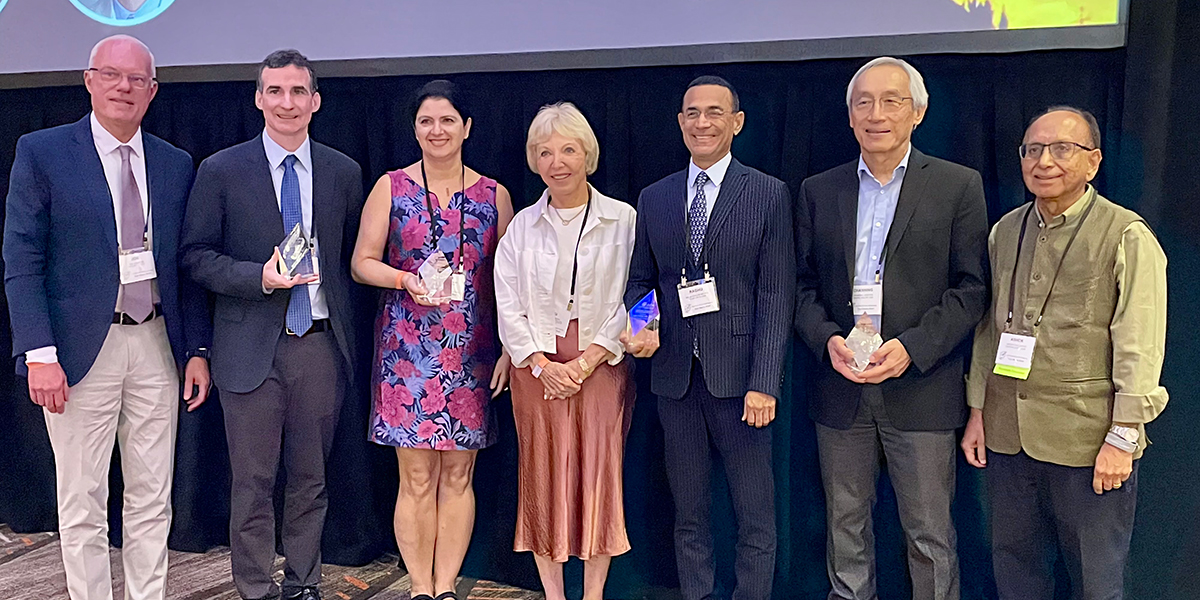Each year, the APA gathers a global community of researchers to explore the latest advancements and opportunities in clinical and basic science research focused on pancreatic diseases, with an emphasis on pancreatic cancer. As part of this collaboration, the Hirshberg Foundation hosts the annual Hirshberg Symposium, spotlighting cutting-edge topics. This year’s symposium, Targeting KRAS to Treat Pancreatic Cancer, delved into the evolving therapeutic landscape of KRAS inhibitors and shared fresh perspectives on the biology and treatment strategies for pancreatic cancer.
Field and Historical Timelines
Channing Der, PhD
University of North Carolina, Chapel Hill
Dr. Der reviewed the seminal findings in the field of KRAS starting with the identification of this signaling protein and the central role it plays in cellular physiology. Dr. Der is an expert in KRAS, made many of the initial discoveries about KRAS and continues this research. Nearly all pancreatic cancers have a mutation in KRAS, and it is thought that this is an initiating factor in pancreatic carcinogenesis. KRAS may have the same impact on as many as 20% of all cancer types.
Current Therapeutic Landscape of KRAS Inhibitors
Gabriela Chiorean, MD
Fred Hutchinson Cancer Center
Dr. Chiorean reviewed many of the clinical trials that have used KRAS inhibitors to treat cancer. Very recently, advances in the understanding of the structure and function of KRAS has allowed the ability to develop drugs that target this protein. Early trials with KRAS inhibitors like sotorasib (the first KRAS inhibitor approved by the FDA which targets the G12C mutation) and others indicate these drugs can have equal benefit to traditional chemotherapy in delaying cancer progression in patients with advanced disease. Now there is interest in combining KRAS inhibitors with other modalities like tumor vaccines and chemotherapy.
New Insights Into the Biology and Therapy Strategies for Pancreatic Cancer
Raghu Kalluri, MD, PhD
University of Texas MD Anderson Cancer Center
Dr. Kalluri reviewed the biology of KRAS inhibitors and how cancers can have variable KRAS mutations in tumor development. Importantly, it is possible to reverse the impact of KRAS on early changes in the pancreatic cancer development before the cancer is formed with KRAS inhibition in models. This demonstrates the importance of KRAS and how targeting this abnormally active protein is potentially very valuable for patient treatment.
Mechanisms of Resistance to KRAS Inhibitors
Andrew Aquirre MD, PhD
Dana-Farber Cancer Institute, Broad Institute at Harvard and MIT
Dr. Aquirre discussed the current status of KRAS drugs and relayed that there are as many as 100 new KRAS inhibitors in development to treat cancer. Each drug has a different mechanism of action and because pancreatic cancers can have variable expression of mutant KRAS throughout the tumor and over time, it will be important to understand the mechanisms of resistance to these new drugs so treatment can be revised for the patient as the tumor evolves.
The 2024 Hirshberg Symposium provided a comprehensive exploration of the latest advancements in KRAS research, emphasizing its critical role in pancreatic cancer development and treatment. From historical milestones and groundbreaking therapeutic strategies to insights into resistance mechanisms and evolving clinical approaches, the panelists illuminated the promising future of targeting KRAS to improve patient outcomes.
As research continues to unlock new possibilities, collaboration and innovation are key to driving progress towards a cure for pancreatic cancer. The Hirshberg Foundation remains committed to supporting transformative research and sharing these critical updates with the community.
Watch the full recording of the Hirshberg Symposium from the APA →


